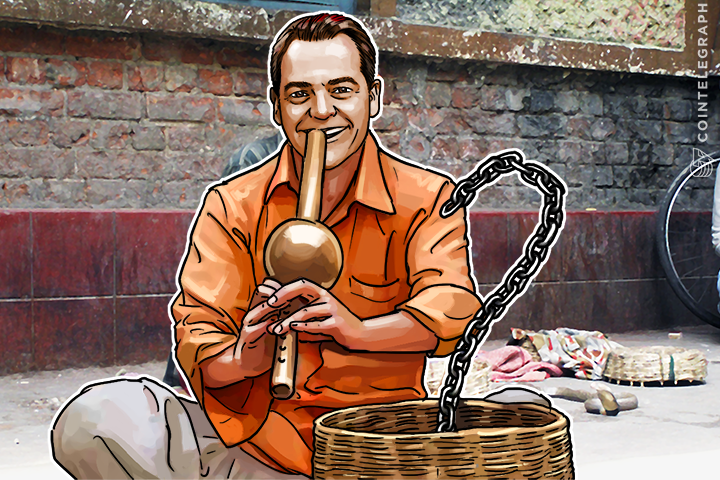The Blockchain must be handled with the utmost care. Financial market expert, Stephen Corliss speaks with Cointelegraph on this and other subjects.
Trust Murdered
The financial sector has inflicted endless pain on itself and society, speaks out Corliss:
“This was a result of a long history of bad actors, flawed business practices, excessive leverage and a shield of secrecy that has resulted in a longstanding lack of trust by their very customers, the general public.
Casual observers of history often conclude that the industry must be riddled with greedy, inept and dishonest professionals whose excessive appetite for yield and large compensation packages outweighs the needs of society.
As a self-proclaimed student of the financial industry who has spent more than half his life working within this industry and studying the history and current rules of the global financial system.
I can tell you that both the industry at large and the regulatory bodies that oversee them consist of many talented individuals and institutions of very high character who care about society."

Tainted by Scandal
Its failures, however, have been quite devastating and, in most cases, the result of those who targeted the vulnerable or ill-informed, whether it be Charles Ponzi in the 1920’s or more recently Bernie Madoff.
These scandals have certainly played a role in tainting the industry’s image but it’s the more systemic problems, such as the 2008 GFC, that have hurt the industry the most as they often result in global contagion, affecting all levels of society.
It is these problems that worry me most as they are unintentional and typically the result of shortsightedness, inadequate controls, poor management oversight, failed policies or a simple lack of in-depth knowledge of products, processes and the rules that govern them.
Blockchain, the Legitimate Prescription
In a less complex environment, I believe Blockchain ledger and smart contract technologies provide the global financial industry with its first legitimate opportunity to transform itself into an industry with a much healthier ecosystem able to overcome the aforementioned issues to regain the trust of society.
In this perfect world, Blockchain technology would allow the industry to replace certain of its outdated multi-layered technology infrastructures, associated processes and business models.
In this simple environment, the industry would be able to perform almost anything on an open ledger with smart contracts including customer onboarding, establishing customer agreements, providing risk, fee and conflict-of-interest disclosures, finalize and agree contractual terms on anything from securities transactions to mortgage loans to insurance contracts.
To even forming and transacting loan and underwriting syndications amongst institutions, operating securities finance facilities such as securities lending and repurchase agreements or even operating entire limited partnerships and master trusts on semi-private ledgers.
Moreover, although unfamiliar by the broader public, a rather significant use for the industry also involves vast reporting that occurs after the fact where most global financial institutions today are mandated, by jurisdictional rules or laws, to report certain financial transactions to local regulators.
Alleviating Burdens
This reporting often involves anything from stock and bond orders and trades (or trade and transaction reports), customer securities account free credit and margin balances or Client Asset Reports, CMAR’s, Call Reports, CTR’s (currency transaction reports), large trader reporting, Electronic Blue Sheets and so much more.
If the financial industry developed Blockchain technology in such a way that it created ledgers that were accessible or visible by regulators and/or outside service providers, much of these additional very burdensome reporting processes and associated costs would be eliminated, or at a minimum significantly reduced, whilst allowing regulators to monitor markets and firms in real-time more transparently to reduce risk and market manipulation.
Such a world would allow us to digitize almost anything from securities issuance and exchanges to payment and settlement systems, which would finally allow markets to achieve real-time settlement across the globe resulting in a system of much less risk.
Although the financial industry could do almost anything with the technology, recognizing these benefits will take quite some time because of innumerable enterprise and capital market structural constraints and barriers that exist involving anything from global competition to legal risks associated with intellectual property, privacy rights, trade secrets to regulations and rules of law.
We must tread with care
However, with competitive pressures mounting, existing industry firms appear to be rushing to get out in front of this disruptive technology while Venture Capital firms invest large sums of capital in new entrants. This is actually what keeps me up at night nowadays as I can tell you from experience that there are only a very small handful of financial practitioners in the world who have the depth and breadth of knowledge of the global financial landscape that this work requires.
Without their insight, I’m quite afraid that the financial industry (both new and existing firms) will repeat their mistakes from the past leading to major systemic problems or further exposure of consumers who can ill-afford it.
In fact, this is partly what has prompted me to develop Impact Catalyst, which is a Social Curator for entrepreneurs, and dFused which will deliver Social Markets using blockchain and smart contracts.
I would say to those desiring a new financial system that serves society, as I do, that if we are to recognize this new reality we must first understand how capital markets work at the core within each market and across all products, before attempting to design a new model.
If we do not move carefully, we run the risk of hurting society and missing a real opportunity to develop a healthier financial model accessible to everyone no matter one’s financial wealth.


